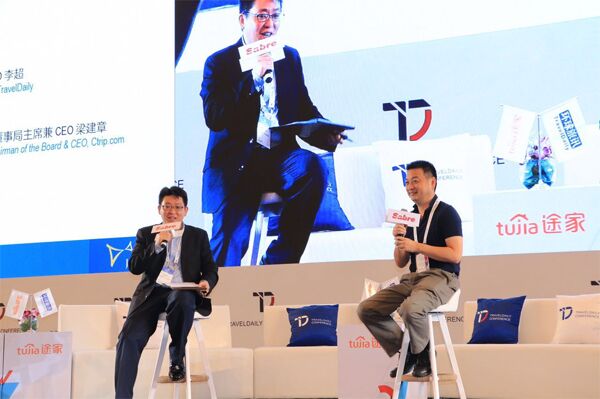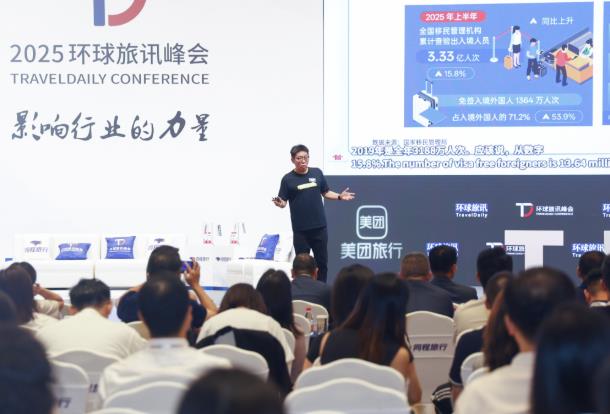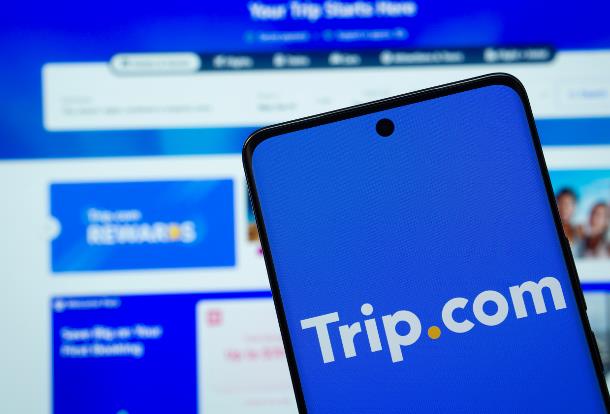ChinaTravelNews, Nicole Sy - It’s Wednesday morning, and the TravelDaily Conference, titled “Embracing the New Era,” is starting off with a bang. Kicking things off right away is arguably the Chinese travel industry’s Most Valuable Player, James Liang, CEO of Ctrip. Likely the most formidable force in the Chinese tourism and travel landscape, over the past year, Ctrip has merged and acquired its biggest rival, invested in shares of many smaller players deemed worthy, and engaged in an unprecedented move and invested in an airline.

Charlie Li, CEO of TravelDaily and James Liang, CEO of Ctrip
CEO and founder of TravelDaily, Charlie Li picked Liang’s brain on his investment strategies, engaging new customers and where the company was headed. On investment, Liang says it was not a due to a specific strategy but a case of opportunity.
“Investment sometimes just happens,” he said of their return to platform-based investment strategy. “You have to adjust strategy based on the opportunity. With investment strategy, we are kind of proactive, though we are open to the whole supply chain industry.” However, Liang says Ctrip is more cautious about the back-end side of investments.
On their two biggest moves, the acquisition of biggest rival Qunar and investment in China Eastern Airlines, he admits Ctrip was ambitious with those decisions. “We hope going forward, Ctrip can work closely with airline companies so we can share information with each other. If the information flow will be successful, we can be a one-stop shop for customers,” he says.
“We won't go out of our way to operate an airline, but we are looking for opportunities, because we can improve our profit and customer experience as well. We don’t see quick return from China Eastern. If operations capability will be enhanced, money will come easily.” Other airlines need longer hold their breaths as well, since Liang confirmed no more big investments in other airline companies will be forthcoming from Ctrip.
With Qunar, it was a more complex relationship. “We managed to improve ourselves a lot when we were competing with Qunar,” Liang recalls. “On our relationship with Qunar before the merge, we had a lot to learn from them and vice versa. With merging we are stronger and a lot more successful than before.”
The combining of the two companies is what Liang considers a win-win for all parties. “Integrating on a service level, we learned a lot from their experience,” he says.
Then there is the issue of profit over such a huge acquisition, where both groups were on different pages. “Another thing we have to look at is how to make money. The management team of Qunar weren’t thinking of making a lot of money. They were looking at big data how to optimize customer experience.” Liang said he learned that profit would only come in time and with proper integration.
Though he also had lessons for other market players: make sure your plans are sustainable or you will encounter challenges you cannot overcome. “The market is still growing, but for those who lack innovation, they are just burning money,” he warns. In the aftermath of the showdown, “good players will do well, bad players will do badly.”
He is asked: does that mean that as a board member of Tuniu and LY.com where Ctrip recently acquired a shock of shares, do you encourage them to spend more or less? Liang laughs at this, and shrugs with a knowing smile.
On Being Number 1
Despite being the biggest fish in the pond, Ctrip isn’t planning on resting on its laurels. Innovation, balance, and still acting like a start-up are keys to maintaining their top position, according to Liang. “We have to be agile, not only from the bottom up but also from the top down point of view,” he says. “Most innovation is from a top down manner, but top down has its demerits sometimes where top management turns a blind eye to feedback. Hopefully we can have a closed feedback loop like the mindset of a startup company.”
Easier said than done for larger companies like Ctrip that don’t have the start-up flexibility like they used to. “One cannot change whole structure in place, that’s why we have to keep a balance between innovation and structure management,” claims the Ctrip CEO. “We must balance efficiency and risk management.”
Learning from competition is also very important to continuously improve, Liang says. “Competition is a good thing for us, if there is a world free from competition, there’s no pressure to get better. We’ve had competition, but it’s a good thing,” he says. “As the biggest in the market, we have the product advantage, but it comes with the biggest opportunity as well.”
As Ctrip grew, its most loyal customer base entered their middle-aged years, typically classified as those born in the 60’s, and 70’s. With 60% of China’s most active travelers now being born in the 80’s, industry watchers wonder what the travel giant’s plans are to capture the same loyalty with millennials as with their older counterparts.
“I think for the entire group, the base number is very big. For China and the middle class, the base number of the middle class growing dramatically,” says Liang. But when it comes to different marketing strategies to this new group, “I don’t think there’s any drastic change,” he explains.
“Currently rapid economic growth means some of them are already in positions of CEO or VP,” Liang explains. “Though for those born after 1995, we might have to change our way of promoting. Most are born with a silver spoon in their mouths, so maybe marketing will be different.”
An active promoter of China’s second child policy, Liang believes that the travel landscape for China will continue to grow. “For tourism, growth is stable. The kids (of the second child policy) will mostly affect Chinese education market for now, but later when they are grown. For the older generations, they will also affect tourism market. Those born in the 60’s and 70’s will retire rich and will have time to travel when they retire,” he says.
When it comes to Ctrip’s own growth, Liang sees the company as maintaining its same proactive investment attitude, though with no specific target. The two things to consider when expanding Ctrip, he says, are “if we see potential there, and if the market likes our product.”
When asked to specify geographically, Southeast Asia and India were the first to come to his mind. “We see a lot of potential with Southeast Asian countries because it has the biggest customer base and biggest product offering as well,” he explains.
“For India, given investment considerations, not a lot of Chinese people are traveling to India, but it has great potential and movement,” says Liang. “India today was China 20 years ago. But it depends if the Indian market will take to Ctrip as well. We have to be attractive to them, if it makes sense for them, they will say yes to our product.”
In the next decade, Liang is confident and hopeful that Ctrip will have opportunities to secure their position not only in China but also the global market. “We hope to be the first Chinese travel brand going global,” says the CEO.
“We have learned the hard way, for example, and our experience can be a role model for a lot of western countries as well (going into another market). For the US, we haven’t invested a lot in it yet, only in those serving the Chinese market,” he says.
The exceptions are Travel Fusion and Priceline. Liang explains as global companies with reach and footholds in plenty of markets, it made natural sense for Ctrip to work with them. For Priceline, Liang believes both companies are perfectly complementary to each other and not at all competitive. “We believe we can make further innovation,” says Liang. “It’s an inspiring future in an exciting marketplace.”
As for his own plans, “I would like to travel!” he says to much laughter from the audience. He believes he won’t be with the company forever, but will continue to explore and innovate, much like Ctrip.




